Struggling through the crowds and jumping up onto a market stall to get a good look at a grey-haired man in African dress, far away up on the Brixton Recreation Centre steps. It was he, not the prince standing next to him, who everyone cared about – he was, of course, Nelson Mandela. I was 10 years old in 1996 and, as a sign of how important a day it was, my primary school had let everyone off school for Mandela’s visit to Brixton. Some lucky people won tickets to get inside the Rec to hear him speak, others simply went to see him, chant his name and cheer him on as he arrived. When Mandela left Brixton to give a speech in Trafalgar Square, so many people ran after the car that Brixton Road was left littered with their shoes. Brixton’s experience of Mandela was a small but significant one – it was Brixton that he chose to visit, not anywhere else in the UK. Less than a decade before it had been the centre of riots, but it was also the centre of struggle for black rights in the UK, the home of Olive Morris, a place that had given a lot to the apartheid struggle, a place with a large black population, an iconic area. Today, some of those who saw Mandela in Brixton 17 years ago share their memories and pay tribute to a man whose influence across the world has been stronger than really anyone can say
Tim Donaghy
I was up bright and early so I made sure I got a front row place because I didn’t get a ticket to get in the Rec. I was outside the Jacaranda as it was then – now it’s that Craft Beer place. It was really good, I got really close to Mandela and Prince Charles. Someone put a girl over the railings with flowers to give to Nelson Mandela and the security got in a flap and put Mandela and Charles in a car to whiz them off to Trafalgar Square where he was giving a speech at South Africa House.
Everyone chased the car. There were shoes everywhere on Brixton Rd because everyone lost them when they were running. Everyone followed the car up to Trafalgar Sq.
We were so proud he was coming to Brixton – he’s the greatest man of our lifetime. He came to Brixton for a personal thank you. Through that time [apartheid era] no one would buy anything South African and everyone was going on all the marches.
Aubrey Nunes
That day when Nelson Mandela came to Brixton was the most important day in the history of Brixton. I was an agent between the anti-racist and the anti-apartheid movement in London. I took my kids off school that day, which I’d never done before. It was truly special. Whoever played the national anthem only played the first half – it was a terrible mistake. I feel very proud that Brixton was singled out, it was such an honour. The most famous politician in the world comes to London and chooses Brixton. Brixton had a long, active record of supporting the freedom struggle and that was presumably registered somewhere.
Stuart Horwood, watch stall on Pope’s Rd
I was here, right on my pitch on the day that Nelson Mandela came to Brixton Recreation Centre. I remember the thousands and thousands of people that were here to see him, I remember the carnival atmosphere that we had and just the sense of one love. Brixton chooses people and I think Brixton actually chose Nelson Mandela to come here, so I think it was a match made in heaven myself. For Brixton’s history it’s a major event – I can’t really think of anything that’s been more significant as far as positive things go. The sense of respect for the man who’s a great icon – we can only be thankful that he came to Brixton. I hope that he’s at peace.
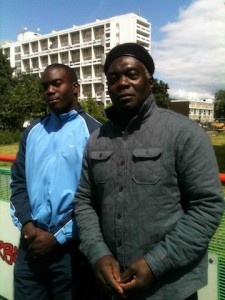
Tony Moody, founder of Lambeth Cricket Academy
Back in the day, a community cricket player like me would try so hard to climb my way towards the top. Many players would be excluded or exclude themselves from the system, many then cope by trying to establish a variety of means, some not always desirable, to survive in their every day lives to distract them from their hidden disappointment.
Nelson Mandela gave up his life for people generally to have equal rights and justice, similar to Jesus Christ. On the day of his visit it was like having a proper Reggae blues dance (party). I took my son and explained the importance of his visit, we now share the same dream of a United World Cricket Team.
Sian Williams
We stood on a market stall to get a good view (see below). We still have the T-Shirt.
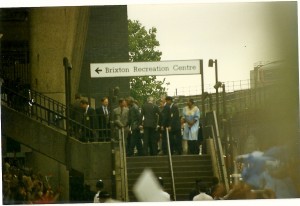
Charlie Jewell
I remember standing there in the big crowds, just past the bridge, and seeing Mandela on the steps there. There were big crowds. I was only eight years old – I am proud to have been there and to be able to say I’ve seen Nelson Mandela in the flesh.
Tessa Livingstone
I was incredibly excited. There were loads of people there and it was exciting. We came later than we should have done, so we weren’t very close. Everybody was chanting for Mandela. He came here because it’s an iconic place.
Adrian Short
I didn’t get a good photo of Mandela when he visited Brixton in 1996, but I did get this – says it all:
These memories are just for starters – please share your own memories and thoughts in the comments below.

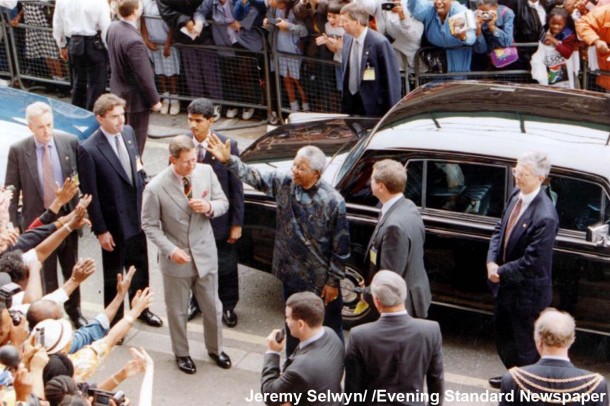
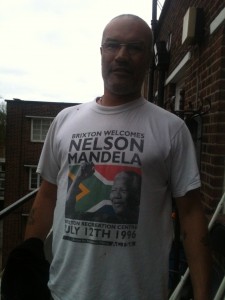
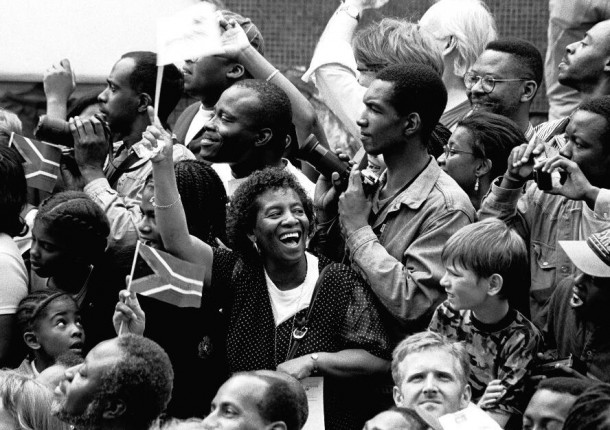


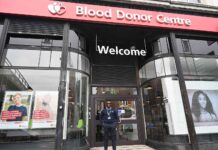



[…] It goes without saying that he was a hero to us, as he was to anyone on the left field of politics. The struggles of Mandela and his comrades raised South Africa from the oppressed, white-ruled land enjoyed by my wealthy relatives in 1922, to the liberated ANC-ruled republic I was able to visit in 1997. I have always regretted my failure to book the day off work when he visited my local streets in 1996. […]
I remember visiting Nelson Mandela at The Recreation Centre in 1994/1995. But I don’t actually remember him going to Brixton in 1996.BUT one thing that made me laugh is when he said that he wanted to put every single one of us in his pocket & take us back to South Africa.
[…] Nelson Mandela of course passed through Brixton Rec back in 1996 and is one of the strongest images that appears on the mural. […]
Nelson Mandela memorial
With all the out-pouring of grief and celebration for the life and achievements of Nelson Mandela, now would be a fitting moment for Lambeth Borough Council to firm up on its commitment to provide a fitting commemoration to his legacy with a high quality, comprehensive upgrade of the Brixton Recreation Centre, visited by him in 1996.
It so happens that the architect who designed the centre, George Finch, died earlier in this same year.
Kate Macintosh
I remember so well that day in Brixton.
A great day. The unity,and the joy and the love of the occasion. I remember with other Irish people talking to friends from Jamaica and Africa and India, and we all knew, we all understood. Just magic.
I have retired back to Ireland now.
I wish I had one of the posters in the pub windows from that day. I would frame it and tell my grandchildren all about it.
I am very proud to be a Brixton boy of Irish origin. Not only that I am a retired London police officer. Between 1984 and 1998 I served at Brixton Police Station. I was on duty when Mr Nelson Mandela came to Brixton in 1996. Oh wow what a day, one of my best days as a police officer. What a great man, as he walked past me what an aura. He taught us how to forgive and I have no doubt in my mind the world is a better place because of him. God bless Nelson Mandela R.I.P.
I was there that day in the crowd outside Brixton Rec, shouting and waving in my Tshirt, which I still have.
As a council worker for 29 years in Brixton, it is the day when Brixton was at its happiest.
My friend Jon, was part of the official party, organising the visit.
They were all taught the proper terminology, but it the heat of the moment, he just given given a task by the great man himself, and just came straight out and said ” Charles, Nelson wants you”, he said afterwards , he will remember that sentence all his life!
[…] It goes without saying that he was a hero to us, as he was to anyone on the left field of politics. The struggles of Mandela and his comrades raised South Africa from the oppressed, white-ruled land enjoyed by my wealthy relatives in 1922, to the liberated ANC-ruled republic I was able to visit in 1997. I have always regretted my failure to book the day off work when he visited my local streets in 1996. […]